In a beige stone townhouse on a leafy New York street, a political coup thousands of miles away has split an office in two.
Downstairs in the dimly lit building, staffers at Myanmar’s Permanent Mission to the United Nationsreceive orders from the military junta, which overthrew the country’s elected government on February 1.
Upstairs, charismatic ambassador Kyaw Moe Tun is leading what is effectively an underground diplomatic corps, part of an attempt to wrestle back control of the country. His conference room is decorated with portraits of a long line of his military-aligned predecessors, reminders of what he’s up against.
Staffers at Myanmar’s dozens of diplomatic posts around the worldhave been faced with a predicament since the coup.
Stay in their roles and be forced to represent the military junta that has killed hundreds of pro-democracy protesters and locked up the democratically elected leader Aung San Suu Kyi. Speak out and risk being fired and placing themselves and their families in Myanmar in danger.
In photos: Unrest in Myanmar
At least 21 staffers across multiple regions – including Kyaw Moe Tun – have decided they won’t cooperate with the military-controlled foreign ministry. Instead, they are quietly using their connections and relative safety abroad to counter messaging from Myanmar’s military.
Tomany of their former colleagues, they are defectors – people who have turned their backs on duty and the chain of command. Several diplomats who spoke to CNN insisted they are actually loyalists to the democratic government that was overthrown in February.
The issue is getting other countries to see them that way.
They have already had a win – the United Nations has allowed Kyaw Moe Tun to retain his seat and rejected a military-approved replacement. That makes him the only openly anti-coup Myanmar diplomat to remain in office.
That alone won’t be enough. Myanmar’s military rulers could try again to replace him at any time – and the longer the military remains in power, the harder it will be for underground diplomats to secure international recognition.
A military coup
In Berlin, Chaw Kalyar, 49, had stayed up late to watch Suu Kyi’s National League for Democracy (NLD) government be sworn in.
The NLD had been reelected in a landslide vote last year and February 1 was meant to be the day parliament opened. Instead, the country woke up to find men in green military uniform swarming the capital Naypyidaw. Television channels went black. In the days to come, members of Suu Kyi’s government would be hunted down or arrested.
It was heartbreaking, said Chaw Kalyar, third secretary at the Berlin Embassy.As a 16-year-old, she had joined the country’s historic 1988 protests against military rule, and seen friends killed in the ensuing government crackdown. She joined the foreign ministry more than 23 years ago, when Myanmar was under another brutal military dictatorship.When February’s coup unfolded, Chaw Kalyar immediately knew she could not cooperate with the military junta – she remembered how much people had suffered. “We could not just sit by this time,” she said.
As she talked with other embassy staffers in Berlin about publicly supporting the burgeoning civil disobedience movement, Chaw Kalyar was cautious that others in the embassy may support the military.

Many of the country’s career diplomats took roles in the foreign service during Myanmar’s half century of military rule, which plunged Myanmar – then called Burma – into poverty, isolationism and civil war.
Just over a decade ago, the military chiefs put in place a plan that would permit the country to hold elections, liberalize the economy, and transition into a semi-democracy while still maintaining their authority. Suu Kyi’s NLD election win in 2020 was only the second democratic election held since direct military rule ended. The party appeared to be leading the country, but in reality the military remained a powerful force.
The diplomats and embassy staff who denounced the coup were resisting a return to past repression.
Chaw Kalyar knew that if she spoke out against the coup, and the movement against the junta was unsuccessful, she would likely never be able to go home. Despite the risks, she decided to act.
“It’s like all our life has endured this military dictatorship,” she said. “We have to join this movement, and we think this movement can bring down this military coup, and we can finally eradicate this military brutality.”
Thet Htar Mya Yee San, 29, a junior diplomat at the Myanmar embassy in Washington, remembers an emotional conversation with like-minded diplomats in two European cities. Although she was on her first foreign assignment, she and other young diplomats decided they should “give up everything” to support the civil disobedience movement or CDM, which has seen people across Myanmar stop going to work to prevent the country from operating as normal under its new de facto rulers.
But isolated in foreign countries, fearful for their families at home and uncertain of what would come next, they didn’t take action immediately. That would come after a key moment a few weeks later.
A symbolic gesture
On February 26, Kyaw Moe Tun left his office in Manhattan’s Upper West Side with two statements to give to the United Nations – one prepared and approved by the military junta, the other he’d secretly written himself.
When it was his turn to address the 193-member UN General Assembly, Kyaw Moe Tun made a shocking break from diplomatic norms, raising the three-finger salute – a gesture from the “Hunger Games” films adopted by the resistance movement in Myanmar – and calling for the world to restore democracy in his country using “any means necessary.”
“In addition to the existing support, we need for the strongest possible action from the international community, to immediately end the military coup to stop oppressing the innocent people, to return the state power to the people, and to restore the democracy,” said the 27-year veteranof Myanmar’s foreign service, whose default expression is a gentle smile.
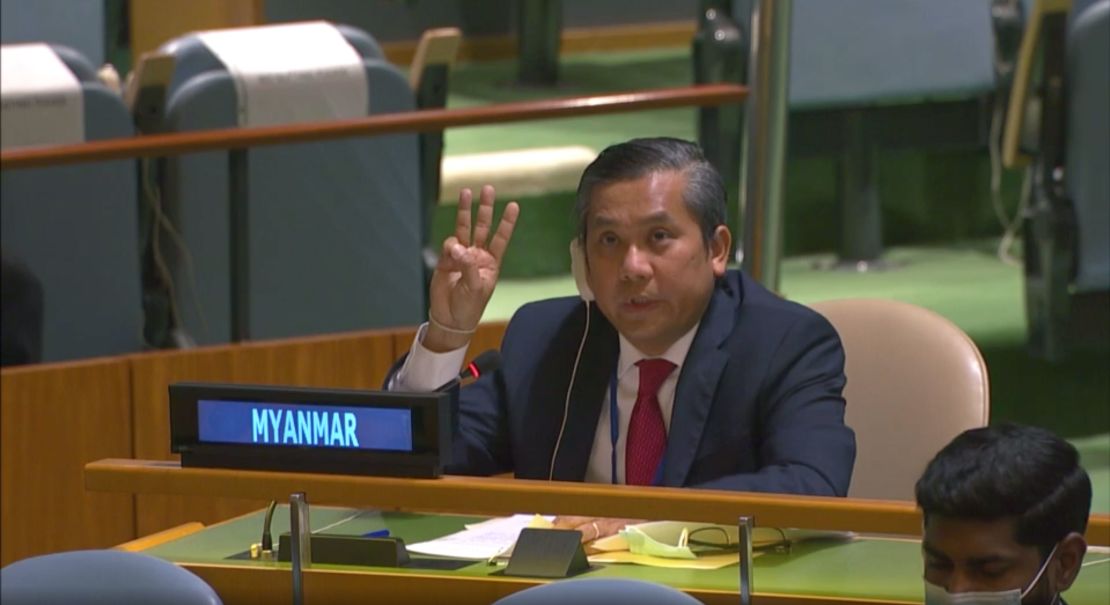
After his statement, military leaders in Naypyidaw contacted Kyaw Moe Tun’s staff in the UN Mission, telling them not to engage with the rogue ambassador, he told CNN. Of the 14 workers at the New York mission, five would soon quit and return to Myanmar.
The following day, he says, the military dismissed him from his post – and sent a notice to every Myanmar embassy around the world instructing them to shun him.
But it was too late. News of his speech rippled through Myanmar embassies and consulates.
The fallout forced the UN to choose between allowing him to remain at the body or accepting the credentials of a new representative put forward by the military – an act that would have signaled acceptance of the coup.
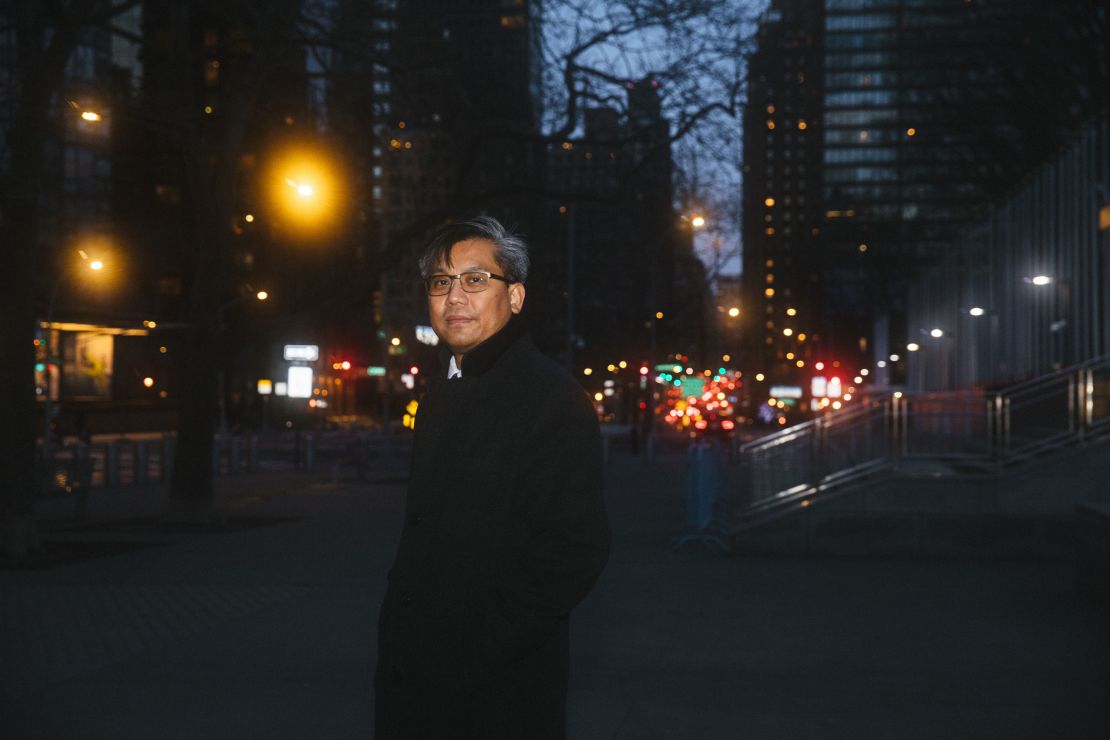
The UN chose to back Kyaw Moe Tun, even though the civilian government that appointed him is now largely in detention or in hiding. And around the world, his speech was inspiring others.
In Berlin, Chaw Kalyar couldn’t hold back tears. Days later, on March 4, she and two of her six consular colleagues announced on Facebook they were joining the resistance movement.
“If we fail, we won’t be able to go back home … but we cannot carry out their work,” she wrote. More than 10,000 people liked her post.
Six days later, she was fired for insubordination.
In Washington, Thet Htar Mya Yee San had already decided to quit her job. She didn’t want to send documents on behalf of the military to Congress or the State Department, as she had done for the democratically-elected government.
Kyaw Moe Tun’s speech emboldened her. “All CDM diplomats started thinking that we could do something. We can contribute to something and we can be helpful to this pro-democracy movement,” she said.
At the end of April, she wrote an op-ed for the Washington Post, explaining why she refused to recognize the military as Myanmar’s leaders.
“Normally, diplomats are representing the government outside the country. But we don’t recognize it as our legitimate government, because it kills its own people,” she said.
CNN has requested comment from Myanmar’s military.
Thet Htar Mya Yee San was dismissed on May 4. She says she hasn’t spoken to her father since she declared her support for the pro-democracy cause – she believes he’s angry with her for getting caught up in the struggle.
Both have now joined the dispersed network of so-called “CDM diplomats,” led by Kyaw Moe Tun, which is working to keep foreign governments informed of the country’s ongoing resistance movement and of alleged human rights violations within the country.
They are also pushing their foreign counterparts to recognize the nascent National Unity Government of Myanmar or NUG – a shadow cabinet formed from the ashes of Suu Kyi’s government, which seeks to restore civilian leadership in the country.
How Myanmar’s parallel government works
Kyaw Moe Tun’s unique toehold at the United Nations offers a potentially invaluable opening for NUG as it pushes for international recognition, in the same way Venezuela’s opposition movement has been globally recognized – though, so far, with little success.
The NUG has said it wants to remove the junta, restore democracy and rebuild the country to create a better place for everyone, regardless of their ethnicity. It appears to have broad support within Myanmar, but some – including several armies representing Myanmar’s ethnic groups – are skeptical.
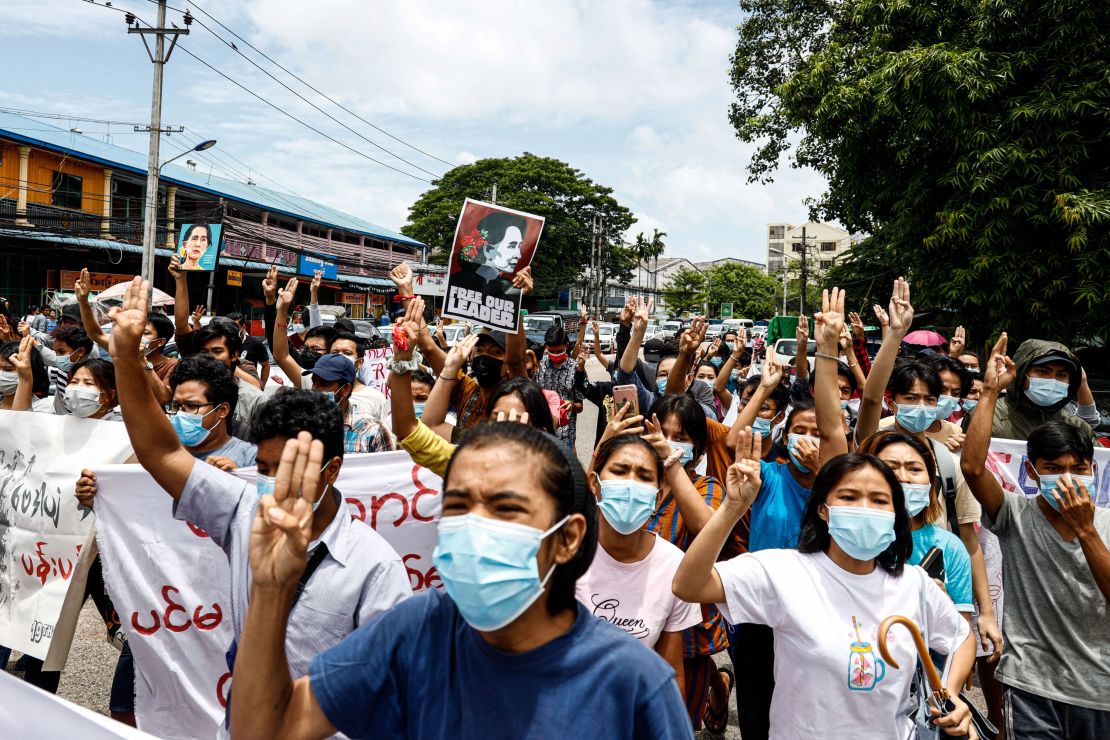
For decades, the country’s myriad ethnic minorities have been persecuted by successive military governments, subjected to state-sanctioned discrimination, conflict, land grabs, and human rights abuses. That did not stop when Suu Kyi’s NLD came to power.
Suu Kyi was internationally condemned for her response to the military’s campaign of ethnic cleansing against the Rohingya Muslim community in western Rakhine state in 2016 and 2017 that forced almost 1 million people to flee to neighboring Bangladesh. The military claimed it was targeting terrorists, and in 2019, Suu Kyi defended its actions at the International Court of Justice against allegations of genocide.
The NLD government refused to even recognize the term “Rohingya” and continued to deny the group citizenship, effectively making them stateless. Representing Suu Kyi’s government in November 2020, Kyaw Moe Tun himself publicly rejected a UN draft resolution on human rights for the Rohingya.
Today, there is no Rohingya representative in the NUG, a fact that is increasingly proving to be an obstacle in its search for recognition abroad. During a May 2021 hearing of the US House Committee on Foreign Affairs, California Representative Ted Lieu said he could not support the NUG – and would oppose its recognition – over its failure to represent the Rohingya.
“The US should not support the National Unity Government in Burma unless it includes Rohingya representation. The prior government killed Rohingya with genocidal intent. NUG Myanmar must commit to stopping the ethnic cleansing actions against Rohingya,” he tweeted after the hearing.
Many ethnic minority people say their demands should be central to any nation rebuilding, which include the formation of a federal democracy with greater rights, representation and autonomy for ethnic people. This is a chance, many have said, to address past abuses and create a fairer system that does not favor the dominant Bamar ethnicity.
Kyaw Moe Tun said the rights of all minorities, whether ethnic or religious or otherwise, should be “equal” in a future civilian government. “We really share the concern of the international community with regard to the Rohingya, and we are also so sorry for what happened to them in 2016 and 2017,” he said.
Tension inside the embassies
One day after Kyaw Moe Tun spoke out at the UN, he got an alarming message from his colleagues in Washington, DC.
They told him that Aung Lynn – the pro-junta Myanmar ambassador based in the US capital – was planning to pay his office a surprise visit in New York, and warned him to be careful.
Within an hour, word spread within New York’s Burmese community, and a crowd formed outside the UN mission, he recalls. According to Kyaw Moe Tun, the Washington ambassador arrived by train and made it as far as the end of the block – but upon seeing the huge crowd, decided to turn back and return to Washington with his entourage. They never entered the building.
“That’s sort of the protection given by our community,” Kyaw Moe Tun said. “Since then, we haven’t talked to each other.”

It’s unclear what the Washington ambassador wanted to achieve from his visit and he did not reply to CNN’s request for comment, but some worried he was trying to lock Kyaw Moe Tun out.
A potentially similar situation occurred in London in April, where Myanmar’s ambassador to the UK, Kyaw Zwar Minn, one of the first diplomats to speak out against the junta, was barred from the embassy by staff aligned with the military. After being thrown out in what he described as another “coup,” he was forced to sleep in his car.
The CDM diplomats are based around the world from the US, to Geneva, to Tokyo. But those in Asian countries face a different set of risks to those in countries vocal on human rights issues, such as in Europe or the United States, Chaw Kalyar said.
“There are a lot of my colleagues who really don’t like the military, and they don’t accept this military coup, but they just cannot join this movement,” she said. “We are lucky that we are in a European country that considers the human rights situation.”
When two diplomats in Tokyo condemned the military violence, they were fired by the junta, local media reported. The Japanese foreign ministry said in a press conference that the Myanmar embassy invalidated their passports.
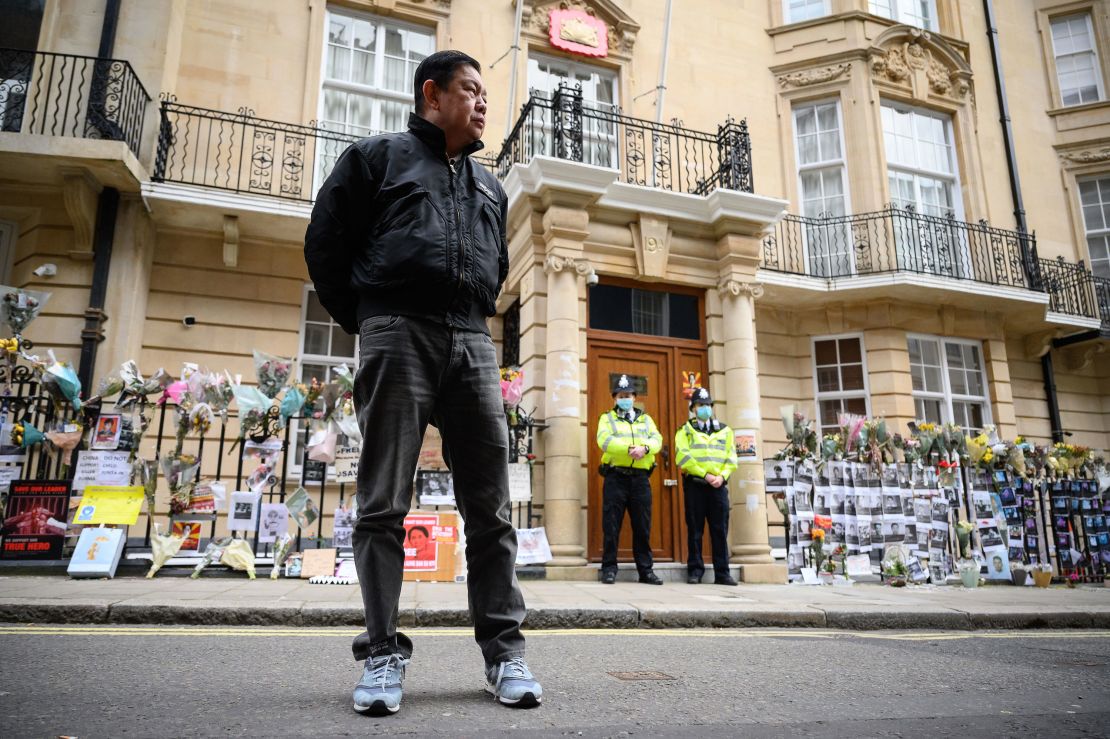
But while the German government is supporting Chaw Kalyar and her colleagues by allowing them to keep their diplomatic status in the country – at least for now – many defector diplomats have less clarity. Japan’s foreign ministry said in May that it had not yet decided how to respond. Foreign Minister Toshimitsu Motegi said at the time that their residency status had not yet been canceled, and a foreign ministry official said last week there had been no progress on their case since May.
When Myanmar’s ambassador to South Korea stayed silent on the unfolding coup, some people in that country’s 20,000-strong Myanmar community grew frustrated. The Myanmar Junta Denouncement Committee – which supports the civil disobedience movement – contacted the ambassador and asked him to “stand on the side of the people.”
“He did not stand with the people, but with the killers,” the group’s co-leader Soe Moe Thu, who has lived in Korea since 1995, said in April. “If the ambassador stands with us, he could use his power that comes with the position to aid the democracy of Myanmar … We are saddened that he dares to live in a democratic nation of South Korea while taking position to support the military dictatorship.”
CNN has contacted the Myanmar Embassy in Seoul for comment.
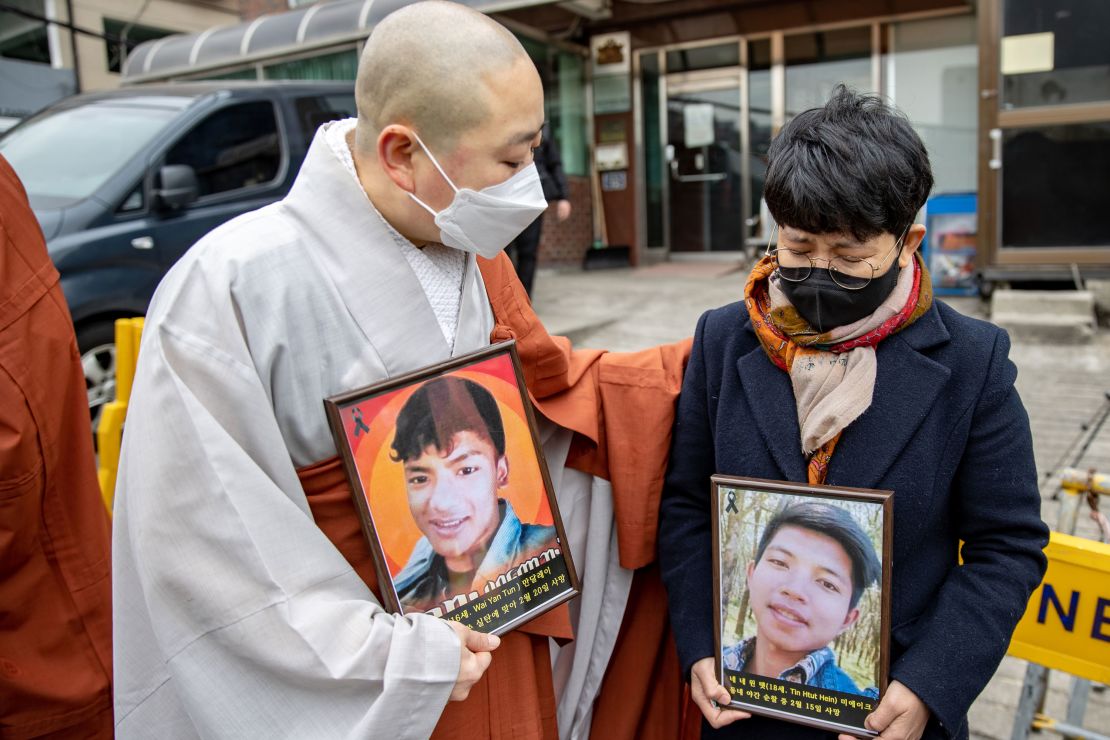
What happens next
The diplomats who refused to represent the junta now face some serious practical questions around their visa status, and where they can live.
The junta has declared Chaw Kalyar’s passport declared void. If she is deported to Myanmar, she believes she will be arrested on arrival. Chaw Kalyar says that makes her stateless.
Chaw Kalyar used to live in an apartment paid for by the Myanmar Embassy in Germany, but she lost it when she was dismissed. When CNN spoke to her, she was living in a hotel, with a charity footing the bill.
For now, she has the support of the German Foreign Office, which told her it was concerned for her safety. She said it can’t officially regard her and her colleagues as diplomats, but has said unofficially that their diplomatic visa status is confirmed until the end of June. After that, they may be able to join a language course and be offered a student status, although the German Foreign Office has not decided yet, she said.
A source from the German Foreign Office said it was working to find a secure and sustainable solution.
Like Chaw Kalyar, Washington-based Thet Htar Mya Yee San has also been cut off – she receives no salary, has no health insurance and no passport. Her future in the US looks stressful and a little scary, she says, but she’s motivated to continue because of the resistance from Myanmar’s people inside the country against military rule.
“They risk their lives every day now to protest,” she said. “So if the people are against it, so we have to be too, because we are public servants.”
The whole issue could come to a head again at the UN General Assembly in September where Kyaw Moe Tun’s grip on his seat could be once again tested if the military junta submits a new request to replace him.
“Controlling the (UN) General Assembly seat is critical,” writes Kelley Currie, a Fellow with the Indo-Pacific Security Project at the Center for a New American Security, and former US Ambassador-at-Large for Global Women’s Issues, in Just Security.
“Practically speaking, control over the UN seat in New York can be a beachhead for the NUG’s broader efforts towards international recognition even as the struggle on the ground continues and the democratic leadership builds out its own institutions.”
A UN spokesperson told CNN the issue has not yet been raised in the plenary of the UN General Assembly during this session. Earlier this month, the assembly voted overwhelmingly to approve a resolution criticizing the coup – a sign of cold welcome to any potential overtures by the junta.
Chaw Kalyar says the global community has to go even further. She wants foreign governments to recognize the NUG, which she sees as the only hope for Myanmar’s future.
“We feel that the international community has failed us many times, but this is the last chance for our country Myanmar. If we fail again this time, there is no hope … it’s like the whole country will be destroyed completely.
“We cannot survive, we cannot survive again, as a democratic nation anymore.”
Caitlin Hu wrote and reported from New York. Julia Hollingsworth and Helen Regan wrote and reported from Hong Kong. Eliza Mackintosh wrote and reported from London. Jake Kwon contributed reporting from Seoul, South Korea. Chie Kobayashi contributed reporting from Tokyo, Japan. Richard Roth contributed reporting from New York.















































































































